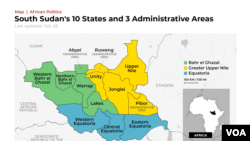Ten years after independence, South Sudan “remains a deeply fragile nation beset by weak governance, pervasive insecurity, fiscal mismanagement, and widespread corruption."
That was the thrust of a U.S. State Department report to Congress, which Reuters says also told lawmakers the Biden administration will continue to pressure those perpetuating South Sudan’s violence and officials not adhering to the 2018 peace agreement.
Cameron Hudson, a Senior Fellow at the Atlantic Council Africa Center, said it is rare for the administration to notify Congress of something when it’s not required to do so unless there is a change in policy or something is about to happen.
“There is clearly an effort right now to acknowledge that whatever has been attempted in South Sudan has not worked under the current leadership,” Hudson told South Sudan in Focus.
“Congress and the administration are probably closer to being on the same page in South Sudan than in a lot of other places in the region,” Hudson said, “where there are vast disagreements over U.S. policy.”
The report to Congress highlights the Biden administration’s disappointment with the slow pace of carrying out South Sudan’s peace deal, said Brian Adeba, deputy director of policy at The Sentry, an investigative and policy organization that seeks to disable multinational predatory networks that benefit from violent conflict, repression, and kleptocracy.
“This report represents a growing exasperation with the system in South Sudan,” Adeba told VOA, “especially, I think, the government with implementing the peace agreement.”
Adeba says the report indicates the State Department is trying to draw more attention to the situation in South Sudan.
“When you look at how South Sudan has also fallen off the radar after the peace agreement was signed, the international community thought that with the signing of the peace agreement everything is going to be okay and it did not keep its eyes on the ball,” Adeba said.
“In the meantime, while attention was diverted, the government and the parties continue to delay the implementation of the agreement.”




